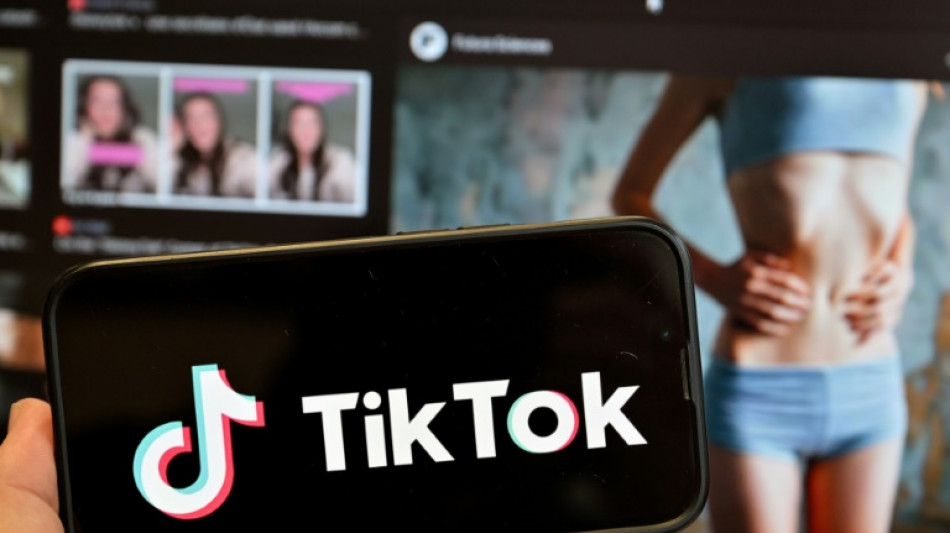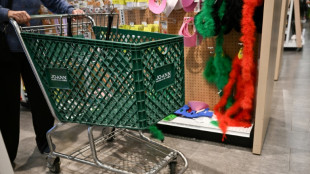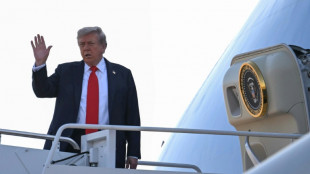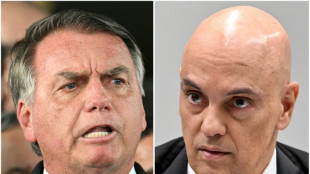
| CMSC | 0.19% | 23.135 | $ | |
| SCS | -0.47% | 16.125 | $ | |
| BCC | 0.01% | 86.63 | $ | |
| AZN | 0.98% | 79.25 | $ | |
| CMSD | 0.28% | 23.3555 | $ | |
| BCE | 1% | 25.625 | $ | |
| BTI | -0.52% | 57.125 | $ | |
| GSK | 0.6% | 39.035 | $ | |
| NGG | -0.11% | 71.484 | $ | |
| RIO | 0.44% | 61.307 | $ | |
| RYCEF | -2.4% | 14.6 | $ | |
| JRI | 0.41% | 13.3315 | $ | |
| RBGPF | 0% | 73.08 | $ | |
| RELX | 0.85% | 48.098 | $ | |
| VOD | 0.3% | 11.675 | $ | |
| BP | 0.77% | 34.405 | $ |

Trump extends deadline for TikTok sale by 90 days
President Donald Trump announced Thursday he had given social media platform TikTok another 90 days to find a non-Chinese buyer or be banned in the United States.
"I've just signed the Executive Order extending the Deadline for the TikTok closing for 90 days (September 17, 2025)," Trump posted on his Truth Social platform, putting off the ban for the third time.
A federal law requiring TikTok's sale or ban on national security grounds was due to take effect the day before Trump's January inauguration.
The Republican, whose 2024 election campaign relied heavily on social media, has previously said he is fond of the video-sharing app.
"I have a little warm spot in my heart for TikTok," Trump said in an NBC News interview in early May. "If it needs an extension, I would be willing to give it an extension."
TikTok on Thursday welcomed Trump's decision.
"We are grateful for President Trump's leadership and support in ensuring that TikTok continues to be available for more than 170 million American users," said a statement issued by the platform.
- Digital Cold War? -
Trump said in May that a group of purchasers was ready to pay TikTok owner ByteDance "a lot of money" for the video-clip-sharing sensation's US operations.
Trump has repeatedly downplayed risks that TikTok is in danger, saying he remains confident of finding a buyer for the app's US business.
The White House had announced Monday that Trump would throw the wildly popular video-sharing app, which has almost two billion global users, another lifeline.
During this new grace period the administration will work "to ensure this deal is closed so that the American people can continue to use TikTok with the assurance that their data is safe and secure," the administration said in a statement.
The president is "just not motivated to do anything about TikTok," said independent analyst Rob Enderle. "Unless they get on his bad side, TikTok is probably going to be in pretty good shape."
Trump had long supported a ban or divestment, but reversed his position and vowed to defend the platform after coming to believe it helped him win young voters' support in the November election.
Motivated by national security fears and a belief in Washington that TikTok is controlled by the Chinese government, the ban took effect on January 19, one day before Trump's inauguration, with ByteDance having made no attempt to find a suitor.
TikTok "has become a symbol of the US-China tech rivalry; a flashpoint in the new Cold War for digital control," said Shweta Singh, an assistant professor of information systems at Warwick Business School in Britain.
The president announced an initial 75-day delay of the ban upon taking office. A second extension pushed the deadline to June 19. Now the deadline is September 17.
- Tariff turmoil -
Trump said in April that China would have agreed to a deal on the sale of TikTok if it were not for a dispute over his tariffs on Beijing.
ByteDance has confirmed talks with the US government, saying key matters needed to be resolved and that any deal would be "subject to approval under Chinese law."
Possible solutions reportedly include seeing existing US investors in ByteDance roll over their stakes into a new independent global TikTok company.
Additional US investors, including Oracle and private equity firm Blackstone, would be brought on to reduce ByteDance's share in the new TikTok.
Much of TikTok's US activity is already housed on Oracle servers, and the company's chairman, Larry Ellison, is a longtime Trump ally.
Uncertainty remains, particularly over what would happen to TikTok's valuable algorithm.
"TikTok without its algorithm is like Harry Potter without his wand -- it's simply not as powerful," said Forrester Principal Analyst Kelsey Chickering.
Despite the turmoil, TikTok has been continuing with business as usual.
The platform on Monday introduced a new "Symphony" suite of generative artificial intelligence tools for advertisers to turn words or photos into video snippets for the platform.
G.Vitali--GdR



